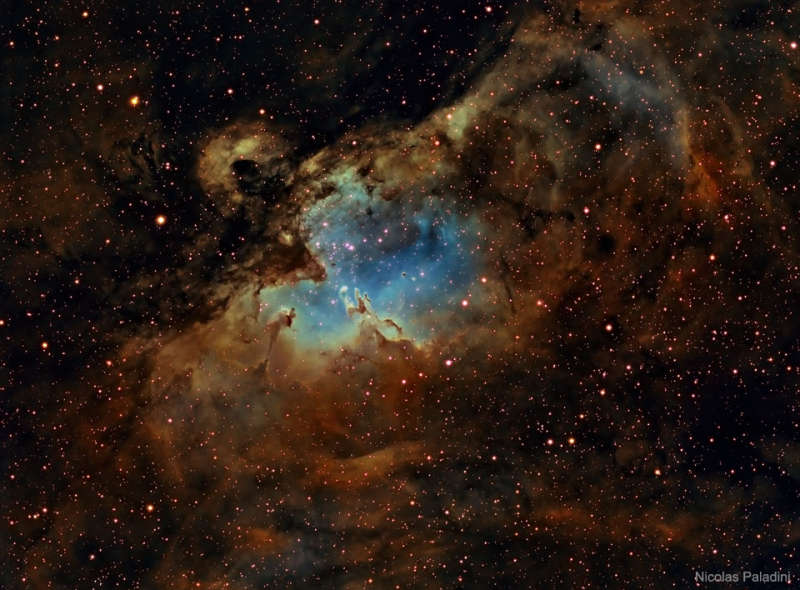Credit & Copyright: Nicolas Paladini
Explanation:
From afar, the whole thing looks like an
Eagle.
A closer look at the
Eagle Nebula,
however, shows the
bright
region is actually a window into the center of a larger dark shell of
dust.
Through this window, a brightly-lit
workshop appears
where a whole open cluster
of stars is being formed.
In this cavity
tall pillars and
round globules of dark dust and cold
molecular gas
remain where stars are still forming.
Already visible are several young
bright blue stars
whose light and winds are burning away and pushing back the
remaining filaments
and walls of gas and dust.
The Eagle emission nebula,
tagged M16, lies about 6500
light years away, spans about 20 light-years,
and is visible with
binoculars toward
the constellation of the Serpent
(Serpens).
This picture
involved over 12 hours of imaging and combines
three specific emitted colors emitted by
sulfur (colored as red),
hydrogen (yellow), and
oxygen (blue).
Gallery:
Notable images of the recent Total Solar Eclipse submitted to APOD
1999 2000 2001 2002 2003 2004 2005 2006 2007 2008 2009 2010 2011 2012 2013 2014 2015 2016 2017 2018 2019 2020 2021 2022 2023 2024 2025 |
Yanvar' Fevral' Mart Aprel' Mai Iyun' Iyul' Avgust Sentyabr' Oktyabr' Noyabr' Dekabr' |
NASA Web Site Statements, Warnings, and Disclaimers
NASA Official: Jay Norris. Specific rights apply.
A service of: LHEA at NASA / GSFC
& Michigan Tech. U.
|
Publikacii s klyuchevymi slovami:
Eagle Nebula - Tumannost' Orla - zvezdoobrazovanie - M 16
Publikacii so slovami: Eagle Nebula - Tumannost' Orla - zvezdoobrazovanie - M 16 | |
Sm. takzhe:
Vse publikacii na tu zhe temu >> | |
